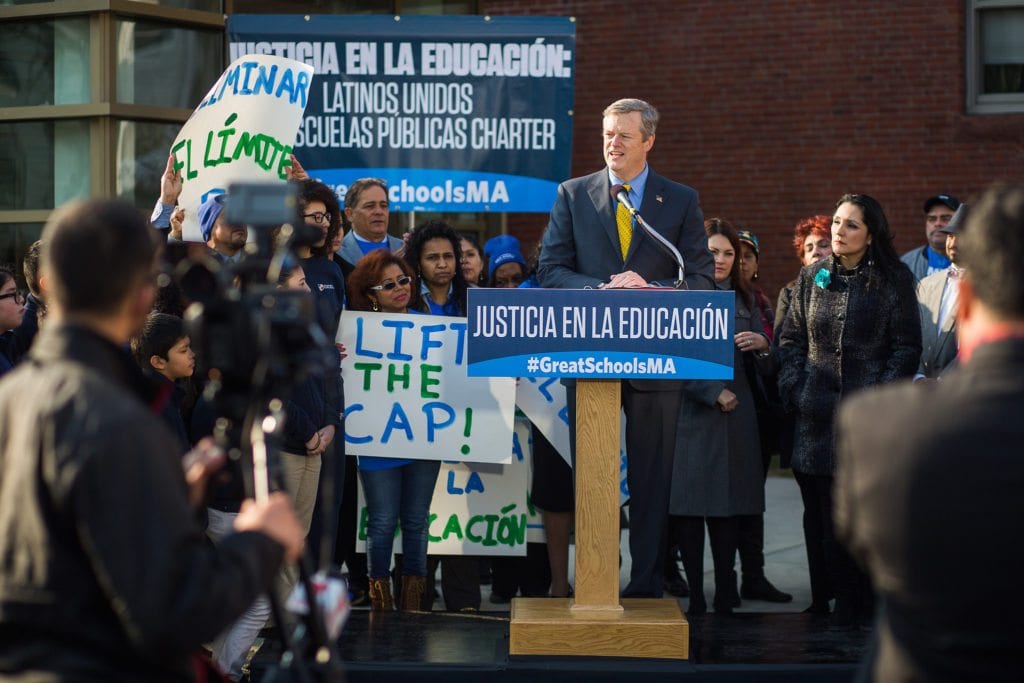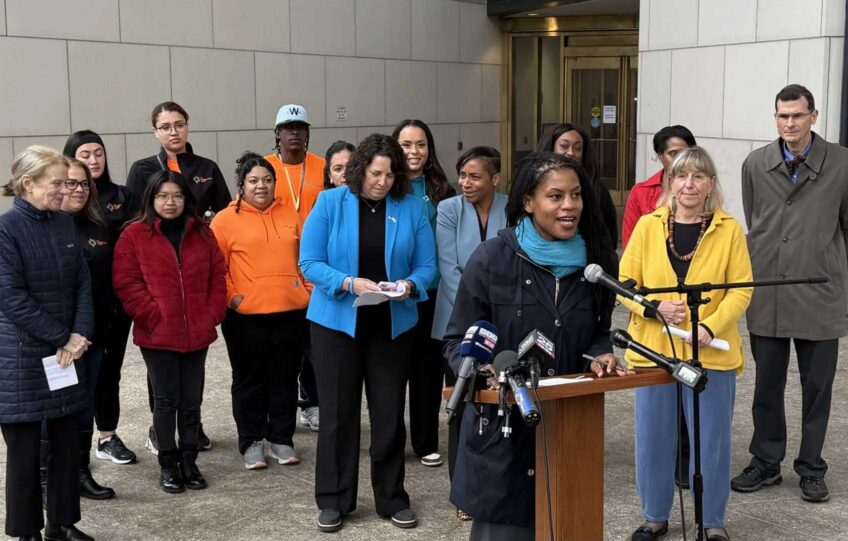Civil rights groups intervene in charter case
Action aimed at countering pro-charter bent among state officials

On Friday, the Lawyers’ Committee for Civil Rights and Economic Justice and other attorneys asked the court to allow Boston Public School students of color, students with disabilities and English language learners as well as the England Area Conference of the NAACP to intervene in a pending lawsuit over the cap on charter schools.
The interveners say that both side currently involved in the lawsuit — the defendants and the plaintiffs — want the cap lifted.
“We face an incredibly one-sided case in what has come to be an incredibly important case,” said Matt Cregor, education project director for the Lawyers’ Committee.
The plaintiffs are five students who did not receive a seat in charter lotteries and instead enrolled in district schools that the state designated “underperforming.” Those students charge that limits on charter seats denied them access to quality education.
Governor Charlie Baker advocates heavily for a cap lift, yet members of his administration are named as defendants on the case. Defendants include Paul Sagan, the former chair of Massachusetts Businesses Leaders for Charter Public Schools who was appointed by Baker to chair of the Board of Elementary and Secondary Education. Another defendant, Secretary of Education James Peyser, is an outspoken advocate for for expanding charter schools at the expense of district schools.
“What’s unique about this case and why we feel it’s essential that we intervene is that the named defendants include the secretary of education and the chair of the board of education, who are staunch advocates for eliminating the cap on charter schools and want the same thing that plaintiffs have sued the court for,” Cregor said. “Looking at the parties, the court is going to get an incredibly one-sided view of this issue.”
The interveners argue that without a cap on charters, their education in traditional public schools would be severely damaged as charter expansions draw further funding from BPS. Interveners charge as well that charter schools fail to equally serve English language learners and students with disabilities and use disproportionately harsh discipline on students of color.
Zero-sum?
In Massachusetts, the charter school movement challenges the dichotomy between charters and district run schools, intentionally using the phrase “public charter schools” in their arguments for lifting the cap.
But defenders of the district-run schools – including student groups in Boston, parent organizations, teachers unions and groups like the Massachusetts Association of School Committees – point out that charters and district-run schools are competing over the same finite funding sources: the near-stagnant Chapter 70 education aid the state provides local districts and municipal property taxes.
While public education proponents and the state’s teachers unions support the Fair Share Tax, a ballot initiative that would increase funding for education for all schools by increasing taxes on income in excess $1 million, charter school advocates have not advocated for increases to education funding. Peyser condemned the proposed tax during a January forum with state education officials and educators.
“I think it will weaken our economy and that will damage our ability as a Commonwealth to support the schools and the other services that we desperately need,” he was quoted as saying in CommonWealth Magazine. “I don’t think the issues that we face as a Commonwealth here are really about the fact that we don’t have enough revenue. It’s about how we’re using our revenues wisely and well.”
Neither the unions nor the charter school supporters support the Senate’s RISE act, which would tie an increase in the number of charter schools in Massachusetts to an increase in funding for both charter and district schools.
A national push for charter expansion
Many education activists interviewed by the Banner say Peyser’s attitude underscores increasing support for charter school expansion in state government.
“The people in power are really ideological about charter schools,” says Jennifer Berkshire, who writes about charter schools on her EduShyster blog. “Jim Peyser does not believe in public schools. He’s one of the foremost advocates for replacing urban district schools with privately-run charter schools.”
Berkshire points to Peyser, who served on the board of the lobbying arm of Families for Excellent Schools, the New York-based organization that is widely seen as the force behind the $18 million campaign to lift the charter cap in Massachusetts.
“More and more, you see people like Peyser in prominent positions in the very system they’re actively seeking to dismantle,” she said.
Peyser also served as a Managing Partner of the New Schools Venture Fund, a group founded by Silicon Valley venture capitalists that funds unified school enrollment seen as key to charter expansion, like the ones being proposed for Boston and Oakland, California. On that organization’s blog, Peyser wrote extensively about how charters can take over school districts (http://www.newschools.org/news/redesigning-school-districts-the-way-forward/).
Battle lines being drawn
Several other officials have weighed in on the charter cap debate. While Baker advocates for full cap lift, Mayor Martin Walsh espoused support for a gradually phased in lift.
Meanwhile, State Auditor Suzanne Bump has called out charter waitlists counts for overstating demand by a minimum of several thousand entries.
Attorney General Maura Healey filed a now-pending move to dismiss the students’ lift-the-cap lawsuit. Healey said the plaintiff’s charge that a cap on charters directly resulted in their receiving allegedly low-quality education used reasoning that was “illogical, speculative and remote.” She noted that not all charter schools are high-performing and that “numerous factors other than the cap could be responsible for the poor performance of some schools.”
In fact, some charge that removing the cap on charters is likely to decrease the quality of education BPS is able to provide, by sapping its funding.
Tito Jackson, head of the Boston City Council’s Committee on Education, said the students suing to raise the cap are on the wrong side of the issue and unless more funding is added to Boston’s education system, a cap lift would damage the education of the 75 percent of Boston’s school-aged children, who attend BPS.
“Those individuals who are in court to raise the charter cap unilaterally and call it a civil rights issue — what is a civil rights issue is taking funding from the Boston Public Schools and not seeking additional funding from state of Massachusetts,” Jackson said.
Where the case stands
At the court on Friday, plaintiffs argued against the intervention, asserting that the interveners’ viewpoint is sufficiently represented by Attorney General Maura Healey, and that that a better approach for the interveners would be to file an amicus curiae, Cregor said, speaking after the hearing. However, Cregor believes the high-stakes of the issue and the complexity of the case makes it important for the students who believe they will be affected to have their voices heard.
“It requires a robustly-developed case,” Cregor said.
The judge chose to take the motion to intervene under advisory and will inform parties of the decision later.
Funding at stake
Every time a student leaves a district school for a charter school, the district provides the charter with funding for that student’s education. But the district has been using a formula that assumes charters accept — and keep — a similar number of special education students, with similarly intensive needs, as the district schools serve. This expectation often results in charters taking more money than they need from districts. According to a Massachusetts Budget and Policy Center report released this week: “Since charter schools tend to educate fewer in-district special education students and the formula doesn’t account for this difference, they often end up receiving a disproportionate share of district special education funding.“






